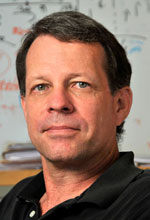非常抱歉,
你要访问的页面不存在,
非常抱歉,
你要访问的页面不存在,
非常抱歉,
你要访问的页面不存在,
验证码:

职称:Visiting Professor
所属学校:Massachusetts Institute of Technology
所属院系:Department of Civil and Environmental
所属专业:Environmental/Environmental Health Engineering
联系方式:617.253.5271
Ph.D. Marine Biology 1986
Microbial life has been integral to the history and function of life on Earth for over 3.5 billion years. As such, microbes have evolved to be the fundamental engines that drive the cycles of energy and matter on Earth, past and present. Additionally, microbes represent the single largest source of evolutionary and biochemical diversity on the planet. Despite their significance, our understanding of the evolution and ecology, and the structure and function of natural microbial communities is limited both conceptually and technologically. Yet the potential of this vast reservoir of genetic and biochemical diversity is enormous, from the perspective of both basic knowledge creation, as well as that of synthetic applications. For these reasons, a major focus of our lab centers on devising and applying new approaches to describe, quantify and model the complexity of natural microbial assemblages, in particular bacteria and archaea, and understand its natural significance and applied potential. Our lab is currently engaged in applying contemporary genomic technologies to dissect complex microbial assemblages. While biotic processes that occur within natural microbial communities are diverse and complex, much of this complexity is encoded in the nature, identity, structure, and dynamics of interacting genomes in situ. This genomic information can now be rapidly and generically extracted from the genomes of co-occurring microbes in natural habitats, using standard genomic technologies. We are now exploring and applying these and related technologies, to better describe and exploit the genetic, biochemical, and metabolic potential that is contained in the natural microbial world. Our central focus is on marine systems, due to the fundamental environmental significance of the oceans, as well their suitability for enabling development of new technologies, methods, and theory.